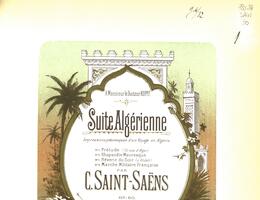Suite algérienne op. 60
Prélude – Rhapsodie mauresque – Rêverie du soir (À Blidah) – Marche militaire française
Saint-Saëns died in Algeria, where he spent his winters. A Rêverie orientale, premiered in 1879 for the benefit of flood victims in Szeged, was inspired by an initial stay overseas in the autumn of 1873. Its success gave rise to the composition of an orchestral suite premiered by the Colonne orchestra in 1880. The suite followed the plan of a symphony; short notes reveal the musical origins of each scene. “Within sight of Algiers. From the deck of the ship still buffeted by a long swell, one can hear a confusion of various noises and make out, in their midst, the cry: Ali Allah! Mohammed rasoul Allah!” Undulating melismas in 6/8 swell to a chorale of horns and trumpets, fortissimo. “In one of the many Moorish cafés of the old city, the Arabs perform their traditional dances, by turns sensual or frenzied, to the sound of flutes, rebabs and tambourines”. Rather than directly imitating the instruments and laments, the fugato stylizes the shifts found in traditional heterophony. “In Blidah. Under the palm trees of the oasis, in the fragrant night, a love song and the tender refrain of a flute are heard in the distance”. Exoticism gives way to the universal. “On the way back to Algiers, the double-quick march of a French regiment is heard, its belligerent strains forming a contrast with the curious rhythms and languorous melodies of the East”. The fanfares symbolise the destruction of local cultures by colonialism, which Saint-Saëns denounced in 1911.

